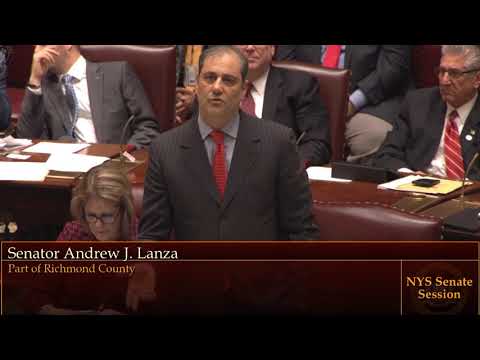
Senator Andrew Lanza, Chairman Of The Senate Ethics Committee, Announces Final Passage Of Ethics Reform Legislation
The New York State Senate today gave final legislative passage to landmark legislation that creates new ethics and lobbying reforms in state government. The legislation (S.2876), sponsored by Senate Majority Leader Joseph L. Bruno, and Senate Ethics Committee Chairman Andrew Lanza, represents an agreement reached earlier this year between the Legislature and the Executive. The agreement implements higher ethical standards for public officials, significantly strengthens penalties for ethics violations and establishes an independent public integrity panel to enforce ethics and lobbying laws.
"As Chairman of the Senate Ethics Committee, I am so pleased to be a part of these historic reform measures which will bring greater accountability and transparency to State government," said Senator Andrew Lanza (R, Staten Island). "It is important for people to have confidence that government is working effectively, honestly and efficiently on their behalf. Only in that environment of trust can we effectively address this State’s critical issues and advance the best interests of the people. This legislation will allow us to do just that."
"The citizens of this state demand accountability and integrity from their state government and public officials," said Senator Bruno. "The historic reforms we are passing today will provide more transparency and openness, while ensuring the public that their interests come first.
"Nearly ten years ago, the Senate passed one of the strictest lobbying reform bills in the entire nation," continued Senator Bruno. "These reforms build on those earlier efforts and continue our commitment to promoting ethical and responsible government that is accountable to New York’s hardworking taxpayers."
"These ethics and lobbying reforms are huge steps toward more accountability, integrity and openness in New York government," said Senator George H. Winner, Jr. (R-C, Elmira). "They’re victories for better and more effective government." The agreed upon legislation significantly reforms current lobbying and ethics laws, including:Prohibits all gifts from lobbyists and their clients of more than nominal value, including travel, lodging and other expenses, and broadens the types of lobbying activities that lobbyists must disclose;
Prohibits all gifts of more than "nominal value" from non-lobbyists to public officials where such gifts might appear designed to influence the official;
Bans virtually all honoraria for statewide elected officials, agency heads and legislators;
Prohibits state employees from participating in any personnel decision or contracting matter concerning a relative;
Bars non-legislative employees from asking about the political affiliation, contributions or voting records of prospective employees;
Prohibits non-legislative employees from using their authority or influence to "compel or induce" any other employee to make political contributions;
Prevents agency heads from becoming a candidate for any compensated elective office unless they resign or take an unpaid leave of absence;
Prohibits elected government officials and candidates for elected local, state or federal office from appearing in taxpayer-funded advertisements; and Closes the "revolving door" loophole by prohibiting former legislative employees from directly lobbying the Legislature for two years, and expands the revolving door restrictions for Executive Chamber employees to preclude appearances before any state agency.The agreement also strengthens penalties for violations of the state Public Officers Law and state Lobbying Law. The maximum civil penalty for public officers who commit ethics violations will be increased from $10,000 to $40,000 plus the value of any associated gain. Lobbyists who repeatedly flout lobbying laws will be subject to suspension.
The agreement combines the current State Ethics Commission and State Lobbying Commission and creates a new State Commission on Public Integrity with broad authority to enforce ethics and lobbying laws. It would also replace the current Legislative Ethics Committee with a new Legislative Ethics Commission that has a majority of independent members and new disclosure requirements.
Two years ago, the State enacted an historic procurement lobbying reform law sponsored by Senator Winner that implemented comprehensive reforms to more effectively regulate the lobbying of government contracts. At the time, it represented the most sweeping reform and overhaul of the State’s lobbying law in generations.
####

